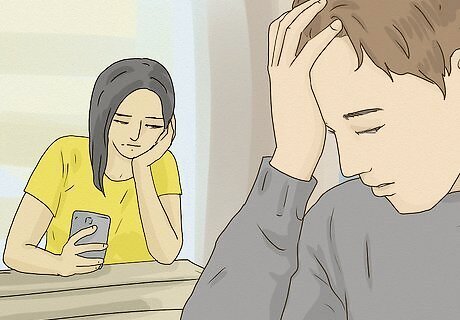
views
- The four stages of limerence are attraction, obsession, elation and frustration, and resolution.
- These four limerence stages help us understand the experience of intense romantic obsession and infatuation.
- Limerence and love are not the same. Love requires acknowledgement of flaws, but limerent people idealize their partners and don’t see the whole person.
The Four Stages of Limerence

Stage 1: The Crush or Initial Attraction You start to get to know your crush and tell each other personal things. This is the stage where you may be able to remove yourself from the situation before the feelings become obsessive. You may feel excited, anxious, energetic, or euphoric. You may find yourself struggling to sleep at night and daydreaming frequently. At this stage, enjoy the thrill of this new relationship. Get to know the person for who they are, but stay grounded and realistic in your feelings.

Stage 2: Obsession or Full Infatuation In this phase, you’re all in with the other person. Attraction builds, and you feel more understood by your lover than anyone else. However, you don't see the other person’s flaws or spot their red flags, and you may sacrifice your beliefs and morals for theirs. You may feel intense longing and frequently fantasize about your future together. You may have heightened sensitivity, anxiety, insecurity, as well as a present fear of rejection. At this stage, take time to process your emotions. Remember that your body is having a chemical reaction, and your feelings may not be totally rational. Consider whether your feelings are based on the reality of this person or on your idea of this person.

Stage 3: Elation and Frustration The third stage of limerence is a rollercoaster of intense highs and lows. The relationship is starting to deteriorate, and the euphoric falling-in-love feelings are wearing off. Your partner may be pulling away and you’re desperately trying to get them back, or you’re seeing the other person more clearly and feeling confused and sad about where your perfect person went. You may feel whiplash from moving between feelings of disappointment and exhilaration. You might feel angry and resentful while struggling with anxiety, depression, obsessive thoughts, or low self-esteem. At this stage, focus on yourself and your needs. Practice self-care and spend time on your hobbies and goals. Remember that your self-worth isn’t defined by someone else’s interest in or idea of you—if this person isn’t reciprocating your feelings or attention, try to move on.

Stage 4: Resolution The limerence must come to a resolution: in most cases, the feelings gradually fade away as the passion dies down. If you still have feelings, but the other person doesn’t, you must accept that your feelings are not reciprocated and move on. If you both still have strong feelings and commitment to the relationship, you can turn the relationship into a long-term bond. You may feel acceptance of the situation and relief at the freedom of letting go. You might even feel grateful for the experience and the emotional maturity it brought you. At this stage, reflect on the romantic experience and relationship. Try journaling or using mindfulness techniques to get in touch with your emotions. Identify the lessons you’ve learned through the challenges.
What is limerence?

Limerence is an intense longing for another person, often one-sided. Limerent people obsessively think about their crush to the point that it impacts other areas of their lives. While their crush may not have outright rejected them, they also haven’t professed their love—leaving an uncertainty and irresolution that leads to a rocky infatuation. It’s normal to be overly-focused on your crush when you first develop feelings—psychologists only consider limerence to be unhealthy when it becomes all-consuming and you feel almost addicted to the other person.

Limerence is not the same as love. Love happens when you can see a person clearly and get to know them for who they are (including their flaws). In limerence, you may see the person as an idea or concept and focus more on your idea of them rather than who they really are. Limerence may turn into love, but it takes reciprocated feelings from both partners and an acknowledgement that the limerence was just one phase of their developing relationship.
Limerence Symptoms & Causes

The main symptom of limerence is intrusive thoughts about the crush. A limerent person may obsessively analyze the behaviors to try to assess how they feel. They also may frequently fantasize about their future together. Other symptoms include: Constantly being reminded of their crush by random objects, places, or situations. An intense fear of being rejected by their lover. Describing the object of their affections as “perfect” or their “soulmate.” Constant mood changes based on the other person’s actions. An abnormal amount of time and money spent trying to look good for their crush.

Researchers believe that childhood trauma can lead to limerence. Other environments and experiences can also make someone predisposed to limerence. People with anxious attachment styles may often find themselves in limerent relationships because they tend to cling to relationships based on fantasy. Experiencing abandonment as a child or adult can also make someone crave companionship to the point of limerence. Understanding your attachment style and addressing your trauma with a therapist can help you avoid limerence with future partners.



















Comments
0 comment